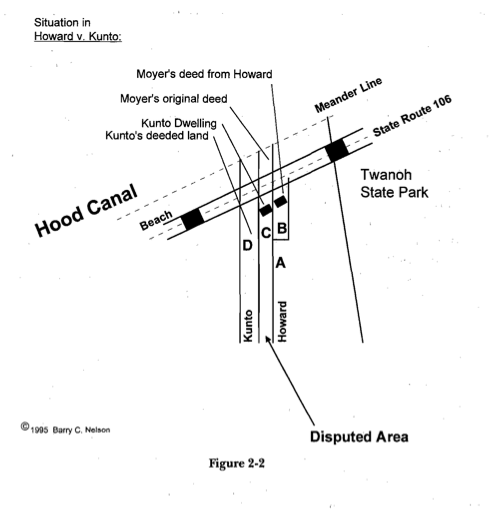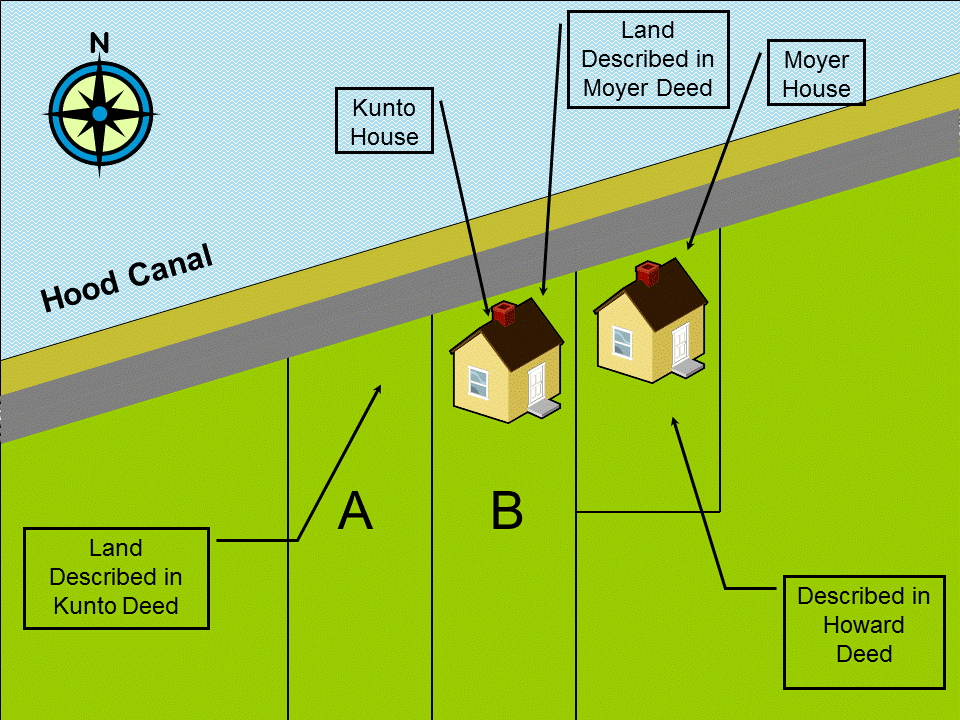Today we will cover Howard v. Kunto (pronounced Koonto, please), O’Keeffe v. Snyder, and adverse possession against the government.
Today’s lecture notes are here.
Howard v. Kunto
This is the Hood Canal, the site of Howard v. Kunto.
Here are some maps that help explain this case.
Texas law allows tacking. Section 16.023:
Sec. 16.023. TACKING OF SUCCESSIVE INTERESTS. To satisfy a limitations period, peaceable and adverse possession does not need to continue in the same person, but there must be privity of estate between each holder and his successor.
Texas law allows disabilities in a few situations. Section 16.001.
Sec. 16.001. EFFECT OF DISABILITY.
(a) For the purposes of this subchapter, a person is under a legal disability if the person is:
(1) younger than 18 years of age, regardless of whether the person is married; or
(2) of unsound mind.
(b) If a person entitled to bring a personal action is under a legal disability when the cause of action accrues, the time of the disability is not included in a limitations period.
(c) A person may not tack one legal disability to another to extend a limitations period.
(d) A disability that arises after a limitations period starts does not suspend the running of the period.
Adverse Possession Against the Government
Here is a 2008 NY Times story discussing a person’s attempt to adversely possess land from the government.
In a city where nearly every millimeter of land is spoken for, Darren Miller thought that he could grab nearly 10 acres at no cost, throw a fence around it and run a lucrative business from it. And that no one would care.
He didn’t even try to keep it a secret. According to prosecutors, Mr. Miller allowed hundreds of truck drivers to park on his annexed land in south Brooklyn, charging them a few hundred dollars a month for the space (“The best deal in town,” one trucker said).
The authorities said that Mr. Miller also ran a “chop shop” and used the land as a dumping ground for construction debris. He kept a sign on the his fence: “No trespassing. Violators will be prosecuted.”
On Wednesday, it was Mr. Miller, 47, of Queens, who was facing prosecution, on charges that included trespassing, illegally dumping toxic waste, and dismantling cars without a license, all on land that prosecutors said belonged not to him, but to the city, the state and a private developer.
Mr. Miller’s lawyer, Vincent M. Gerardi, said his client’s claim to the land was sound, and based on the legal doctrine of “adverse possession,” in which someone can claim title to property he has used for a specified number of years. Mr. Miller, his lawyer said, is a small-business owner who simply made good use of a wasted patch of land.
That land is worth more than $200 million, and the city has plans for it, prosecutors said. The Brooklyn district attorney, Charles J. Hynes, said that Mr. Miller, who pleaded not guilty at his arraignment in Brooklyn Criminal Court, had given “new meaning to the word chutzpah.”
…
According to Mr. Gerardi, Mr. Miller, who operates his own dump truck, has been using the parcel since 1995. In August 2005, the city’s Department of Housing Preservation and Development sent Mr. Miller a letter saying that he was illegally occupying the property.
He responded that he was claiming the land, which he had “enclosed and maintained” for “over 10 years,” Mr. Gerardi said. Under the law, claims of adverse possession can be made if an individual uses someone else’s property continuously for 10 years.
But city lawyers assert that such claims cannot be made against land “acquired for a public purpose.” In court papers, the city’s Law Department said that the disputed parcel was obtained by the city in 1968 through condemnation for the Fresh Creek Urban Renewal Project. To make matters more complicated, though the city owns most of the parcel, some parts belong to the state and others to a private developer, the authorities said.
Since 2005, when the housing department notified Mr. Miller that he was illegally occupying city property, he and city agencies have fought two battles in the courts. Whether he can claim title to the land is still being decided. His arrest on Tuesday was the result of separate legal action to stop him from using the lot as a dump.
Ultimately, Miller was convicted.
O’Keeffee v. Snyder (Adverse Possession of Chattels)
This is Georgia O’Keeffee, as photographed by her husband Alfred Stieglitz
O’Keeffe’s painting Cliffs
The other painting: Seaweed.
 This story proves the value of an accurate survey–a $700,00 was built on the wrong lot!
This story proves the value of an accurate survey–a $700,00 was built on the wrong lot!
Six months after building a large custom house with an ocean view, Missouri residents Mark and Brenda Voss learned of a big problem – it’s on the wrong lot.
Their three-story vacation rental house with an estimated construction value of $680,000 actually sits on the lot next to the one they own in the gated Ocean Hammock resort community.
How did this happen? A mistaken survey.
The Vosses, who own 18 other residential lots in the Hammock Dunes master-planned community, paid $160,000 for one with a street address of 23 Ocean Ridge Blvd. North in June 2012, according to Flagler County property records. They hired Keystone Homes to design and build a 5,000-square-foot house there to use as a vacation rental managed by Vacation Rental Pros in St. Augustine.
…
The builder and Voss each say the error can be traced to the first survey in 2013. East Coast Land Surveying in Ormond Beach misplaced stakes, and the foundation survey and other documents and building activity were based on the error. During construction, dozens of subcontractors arrived each day to work at the wrong lot. And a final survey failed to note the error.
“We require a preliminary plat, foundation and final survey and they all indicate it’s the right lot where the house sits,” said Mark Boyce, Flagler County’s chief building official. “We rely on the surveyor. They are state licensed professionals and we count on them to get it right.”
Calls to East Coast Land Surveying last week were unreturned.
It was another survey who discovered the problem.
It wasn’t until September, six months after the Voss house was completed, that a survey crew working nearby uncovered the error and notified the community manager, who then called Keystone Homes.
And because they are aware of this error, there is no chance they could ever claim an adverse possession.





